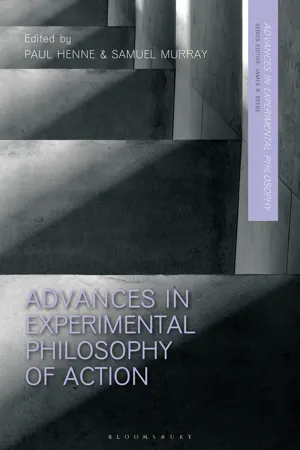
- 264 pages
- English
- ePUB (mobile friendly)
- Available on iOS & Android
Advances in Experimental Philosophy of Action
About this book
What is self-control? Does a person need to be conscious to act? Are delusions always irrational? Questions such as these are fundamental for investigations into action and rationality, as well as how we assign responsibility for wrongdoing and assess clinical symptoms. Bridging the gap between philosophy and psychology, this interdisciplinary collection showcases how empirical research informs and enriches core questions in the philosophy of action. Exploring issues such as truth, moral judgement, agency, consciousness and cognitive control, chapters offer an overview of the current state of research, present new empirical findings and identify where future experimental work can further advance the frontier between philosophy and psychology. This is an essential resource for anyone looking to better understand how science and philosophy can meaningfully inform our knowledge of human agency.
Frequently asked questions
- Essential is ideal for learners and professionals who enjoy exploring a wide range of subjects. Access the Essential Library with 800,000+ trusted titles and best-sellers across business, personal growth, and the humanities. Includes unlimited reading time and Standard Read Aloud voice.
- Complete: Perfect for advanced learners and researchers needing full, unrestricted access. Unlock 1.4M+ books across hundreds of subjects, including academic and specialized titles. The Complete Plan also includes advanced features like Premium Read Aloud and Research Assistant.
Please note we cannot support devices running on iOS 13 and Android 7 or earlier. Learn more about using the app.
Information
Table of contents
- Cover
- Half-Title
- Series
- Dedication
- Title
- Contents
- List of Figures
- List of Contributors
- Introduction to Advances in Experimental Philosophy of Action
- 1 Consciousness, Phenomenal Consciousness, and Free Will
- 2 Skilled Action and Metacognitive Control
- 3 Bringing Self-control into the Future
- 4 Who Is Responsible?: Split Brains, Dissociative Identity Disorder, and Implicit Attitudes
- 5 The Everyday Irrationality of Monothematic Delusion
- 6 Truth, Perspective, and Norms of Assertion: New Findings and Theoretical Advances
- 7 The Distinct Functions of Belief and Desire in Intentional Action Explanation
- 8 Free Enough: Human Cognition (And Cultural Interests) Warrant Responsibility
- 9 Beyond the Courtroom: Agency and the Perception of Free Will
- 10 Do Rape Cases Sit in a Moral Blindspot? The Dual-Process Theory of Moral Judgment and Rape
- 11 How People Think about Moral Excellence: The Role of Counterfactual Thoughts in Reasoning about Morally Good Actions
- 12 Why Idealized Agency Gets Animal (and Human) Agency Wrong
- Index
- Copyright